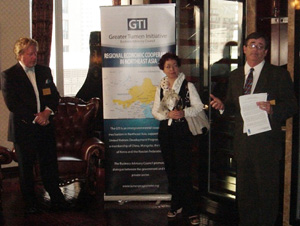Greater Tumen Initiative Event Showcases China’s Northeastern Borders
BEIJING, Jun. 4 – The Greater Tumen Initiative held its first informational meeting yesterday in Beijing at a cocktail and networking event at the tasting room of ASC Fine Wines. Hosted by Nataliya Yacheistova, the director of the GTI, the event showcased the activities of the Business Advisory Council of the GTI and its work with developing opportunities between government and business in Northeast Asia.
The GTI is a United Nations Development Program-sponsored body that originally included the five nations of China, Russia, Mongolia, North Korea, and South Korea – with Japan as an observing member. While North Korea declined to renew its membership in 2008 following U.N. criticism of its nuclear testing, the GTI still promotes and is heavily involved in the development of the Northeast Asia region.

L-R: Chris Devonshire-Ellis, Nataliya Yacheistova, Jim Zimmerman, Business Advisory Council, Greater Tumen Initiative
James Zimmerman, the chairman of the Business Advisory Council, explained the aims and goals of the GTI, stressing the importance of lifting the region out of much of its backwardness and pinpointing the start of infrastructural developments that will eventually come to regenerate much of the Northeast Asian seaboard. Specifically, this includes the eastern coast to the north and south of Vladivostok, and the rerouting of rail lines to this much neglected seaboard. Commenting that the opening up of the eastern seaboard would have profound effects on Northeast China and the ability for cities such as Jilin, Changchun and Harbin to more effectively get their products to markets in South Korea, Japan and the Western coast of the United States, Zimmerman emphasized the importance of generating corporate activity and interest in the region as the GTI served as a platform for business to engage with local governments and to work together to improve infrastructure, communications and transport.
Chris Devonshire-Ellis, a Congress member of the Business Advisory Council then explained to attendees the benefits his firm had achieved through membership of the GTI, including financial assistance with cross border property transactions, the development of an increasing amount of intellect concerning the region within his firm, and the access to opportunities for his clients. Mentioning that as China developed, increasing opportunities were to be found along its borders, he highlighted the Northeast Asia region as a “little understood gem” with “plenty of resources, and developing infrastructure.”
Stressing the need for an increase in corporate involvement with the Greater Tumen Initiative, he highlighted the recent case of a corporate member, who on a GTI mission to Ulaanbaatar, Mongolia earlier this year, had sold several million dollars worth of fire-fighting equipment to the international airport authority. He stated that the search for new opportunities was vital to business success and that the early entrants to markets such as Northeast Asia would succeed, and encouraged attendees to participate.
The Greater Tumen Initiative can be contacted via e-mail for details of corporate membership, forthcoming regional events, and the aims and goals of the group. The GTI’s next mission is to Manzhouli, Inner Mongolia, which serves as China’s largest inland port for access to Russia. Details here. The event is from June 14-15 and includes meetings with the regional governments and a firsthand assessment of trade and business opportunities.
Related Reading
Regional UNDP Council Meeting Promotes Northeast Asian Investment
Manzhouli, China’s Gateway to Russia and Eastern Europe
Trade Opportunities Along China’s Borders
- Previous Article Shanghai Becomes Top Sourcing Center in China
- Next Article State Council Notice Supporting Post-Earthquake Reconstruction in Yushu









